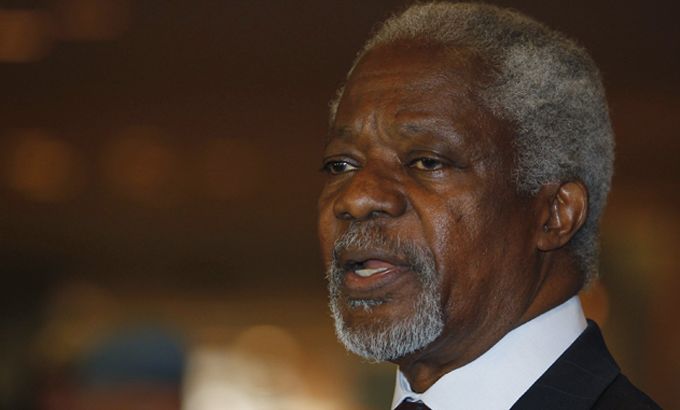Annan: ‘Bold steps’ needed for Syria peace
UN-Arab League envoy says “everyone with a gun” must lay down weapons after arriving in Damascus for high-level talks.

Kofi Annan, the UN-Arab League envoy to Syria, has called on the country’s government to take bold steps to prove its commitment to restoring peace during a visit to Damascus.
Annan arrived in the Syrian capital on Monday for talks with high-level officials as world leaders said his peace plan was the only way to solve the country’s conflict.
The former UN chief called on “every individual with a gun” in Syria to lay down arms, saying he was horrified by a weekend massacre in Houla that killed about 110 people, including 49 children.
“I urge the [Syrian] government to take bold steps to signal that it is serious in its intention to resolve this crisis peacefully, and for everyone involved to help create the right context for a credible political process,” Annan said.
“I am personally shocked and horrified by the tragic incident in Houla two days ago, which took so many innocent lives, children, women and men.”
He was to meet Walid al-Muallem, Syria’s foreign minister, on Monday before holding talks with President Bashar al-Assad on Tuesday, a Syrian official source said.
Earlier in the day, William Hague, the UK foreign secretary, and his Russian counterpart, Sergei Lavrov, called at a joint press conference in Moscow for greater efforts to implement the plan, which calls on both government forces and rebels to cease hostilities and for a Syrian-led political process.
Lavrov said that “who is in power” in Syria was less important than that the bloodshed is brought to an end.
“We don’t support the Syrian government, we support Kofi Annan’s plan,” he said.
Civil war warning
For his part, Hague warned of the possibility of a civil war.
“The alternatives are the Annan plan or ever-increasing chaos,” he said, calling on all parties to cease violence.
“We are not arguing that all violence in Syria is the responsibility of the Assad regime, although it has the primary responsibility for such violence.”
The Syrian National Council, the Istanbul-based umbrella group of
exiled opposition figures, made its strongest call to date for foreign intervention.
“It’s high time for concrete intervention to stop the daily massacres against the Syrian people,” it said in a statement.
“The council appeals to all friends and brothers of the Syrian people to supply it immediately with effective means of self defence before it is too late.”
World powers want Russia, a close ally of Syria, to exert pressure on Assad’s government.
“Russia is in a difficult and isolated position,” according to Al Jazeera’s Rory Challands, reporting from the Russian capital. “Moscow has been a friend of Syria for decades, and has vetoed two UN Security Council resolutions condemning the killing. It needs to look after its strategic and economic interests in Syria, but not appear too much like the protector of a repressive and violent government.”
Lavrov met Hague a day after the UN Security Council unanimously condemned the use of heavy weapons in the Houla massacre.
The world body said in a press statement issued after an emergency meeting on Sunday that the “outrageous use of force” against civilians violated international law and that “the attacks involved a series of government artillery and tank shellings on a residential neighbourhood”.
Major-General Robert Mood, head of the UN monitoring mission in Syria, said some of the dead had been killed by shelling and others shot at close range, but did not attribute responsibility for the close-range killing.
Activists said several children had been stabbed to death.
‘Entire families executed’
The US-based rights group Human Rights Watch said it interviewed survivors and local activists who said “the Syrian army shelled the area on May 25, and armed men, dressed in military clothes, attacked homes on the outskirts of town and executed entire families.
“All of the witnesses stated the armed men were pro-government, but they did not know whether they were members of the Syrian army or a pro-government militia, locally referred to as shabiha”.
Human Rights Watch said “most of those killed belonged to the Abdel Razzak family”.
“Local activists provided Human Rights Watch with a list of 62 dead members from the Abdel Razzak family,” it said.
The Syrian government has blamed the killings on “terrorists” and denied that its forces had used any heavy weaponry in Houla. It said security forces had suffered losses in clashes with rebels.
Activists have confirmed that opposition fighters attacked a checkpoint, but said it happened after government forces opened fire on a demonstration.
The Security Council asked Ban Ki-moon, UN secretary-general, and the UN observer mission in Syria, or UNSMIS, to continue investigating the attacks in Houla.
There are now more than 280 unarmed military observers in Syria to monitor a cessation of hostilities that started on April 12 but lurches closer to collapse each day.
Annan is to brief the Security Council on Wednesday on his efforts to end the 15-month old crisis. The UN says more than 10,000 people have been killed in the uprising against Assad, while Syrian activists put the figure at more than 13,000.
